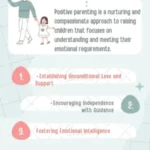Parenting is a multifaceted journey marked by its unique challenges and delightful moments. One particular approach gaining increasing recognition for its efficacy in fostering responsible and caring children is “Parenting with Love and Logic.” Developed by Charles Fay and Foster Cline, this method advocates for a balanced blend of love and discipline, presenting a structured framework that enables children to learn from their mistakes and cultivate responsible decision-making skills. This article delves into the intricacies of the Love and Logic approach, exploring its fundamental principles and practical applications for parents seeking to raise socially responsible and empathetic individuals.
The Essence of Love and Logic Parenting
At the heart of Love and Logic parenting lies the belief in providing children with choices within defined limits. This approach is rooted in the idea that children learn responsibility by experiencing the consequences of their decisions. By offering choices and allowing children to face the outcomes, whether positive or negative, parents employing Love and Logic aim to instill a sense of accountability and foster critical thinking skills in their offspring.

Unconditional Love as the Bedrock
A cornerstone of the Love and Logic philosophy is the concept of unconditional love. This principle underscores the importance of creating an environment where children feel secure, valued, and unconditionally loved. By separating consequences from the emotional aspects of discipline, parents can express love and empathy even in challenging situations. This approach helps children understand that they are loved regardless of their behavior, contributing significantly to the development of a healthy and trusting parent-child relationship.
Balancing Limits and Empathy
Central to Love and Logic parenting is the art of setting clear and consistent limits while maintaining empathy for a child’s feelings. This balance allows parents to establish boundaries without resorting to harsh disciplinary measures. Acknowledging a child’s emotions and offering empathy create an atmosphere where children feel heard and understood. This, in turn, sets the stage for effective communication, cooperation, and the development of emotional intelligence.
Cultivating Responsible Decision-Making
A pivotal objective of Love and Logic parenting is nurturing responsible decision-making skills in children. This involves allowing them to experience the consequences of their choices, providing invaluable life lessons along the way. By guiding children through the natural outcomes of their decisions, parents using Love and Logic promote autonomy, self-discipline, and critical thinking. This approach empowers children to make thoughtful choices, fostering a sense of responsibility that extends beyond immediate consequences.
Practical Implementation of Love and Logic
While the principles of Love and Logic may sound compelling in theory, their true efficacy lies in practical application. Parents can integrate Love and Logic into daily interactions through various strategies. Problem-solving discussions, decision-making processes, and consistent application of consequences based on choices are integral components of this approach. The emphasis on consistency ensures that children benefit from a predictable environment where expectations are clear, and consequences are applied uniformly.
Frequently Asked Questions (FAQ)
Q1: Is Love and Logic parenting suitable for all age groups?
A1: Absolutely. Love and Logic principles are adaptable for children of all ages, from toddlers to teenagers. The approach’s flexibility allows parents to tailor strategies to suit a child’s developmental stage.
Q2: How does Love and Logic differ from traditional parenting methods?
A2: Love and Logic distinguishes itself by emphasizing choices and allowing children to experience consequences, fostering responsibility and critical thinking. Traditional parenting methods may lean more towards authoritative or punitive measures.
Q3: Can Love and Logic be applied in educational settings?
A3: Yes, Love and Logic principles are highly applicable in classrooms and school environments. Teachers can implement this approach to encourage responsible behavior and decision-making among students.
Q4: Is Love and Logic effective in managing challenging behaviors?
A4: Indeed, Love and Logic provides effective strategies for addressing challenging behaviors by linking consequences directly to a child’s actions. The approach prioritizes natural consequences whenever possible.
Conclusion: Empowering Children for Life’s Journey
In conclusion, Parenting with Love and Logic emerges as a potent and holistic approach for raising responsible and caring children. By amalgamating unconditional love with empathetic yet firm discipline, parents can guide their children towards making responsible decisions and navigating life’s challenges with confidence. The principles of Love and Logic, when consistently applied, empower children to become independent thinkers and compassionate individuals. As parents embrace this approach, they not only foster responsible decision-making but also cultivate a foundation for a positive and enduring parent-child relationship. Love and Logic parenting encapsulates a journey of empowerment, laying the groundwork for children to flourish into socially responsible, empathetic, and resilient individuals.





